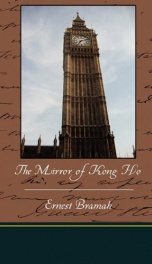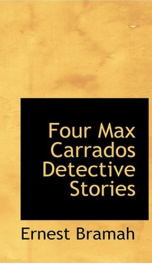Bramah Ernest

Ernest Bramah (20 March 1868 - 27 June 1942), whose real name was Ernest Bramah Smith, was an English author.[1] In total Bramah published 21 books and numerous short stories and features. His humorous works were ranked with Jerome K Jerome, and W.W. Jacobs; his detective stories with Conan Doyle; his politico-science fiction with H.G. Wells and his supernatural stories with Algernon Blackwood. George Orwell acknowledged that Bramah’s book What Might Have Been influenced his Nineteen Eighty-Four. He created the characters Kai Lung and Max Carrados. Bramah was a recluse who refused to allow his public even the slightest glimpse of his private life – secrecy perhaps only matched by E.W. Hornung, the creator of Raffles, and today, J.D. Salinger. Bramah dropped out of the Manchester Grammar School at the age of 16, having been consistently close to the bottom of each class and in each subject. Despite this, he died at the age of 74 a successful and admired author with a wide and deep knowledge of chemistry, physics, law, philosophy, the classics, literature, the occult and ordnance, and was a recognised world expert in a branch of numismatics. After leaving the Manchester Grammar School, he went into farming, first as a farm pupil and then in his own right. He was supported by his father who had risen in a very short time from a factory hand to a wealthy man. The farming enterprise cost his father over £100,000 in today’s money. It was while he was farming that he began to contribute local vignettes to the Birmingham News, which gave him his first taste for journalism and writing. Later he wrote a tongue-in-cheek book about his adventure in farming which, unsurprisingly, found few buyers and was eventually remaindered and pulped. After the farming debacle, his father agreed to support him while he made his way in Grub Street. He was fortunate enough to obtain a position as secretary to Jerome K. Jerome and rose to edit one of Jerome's magazines. After leaving Jerome he edited other journals for a publishing firm which went into bankruptcy. Following these unpromising beginnings, Bramah attained commercial and critical success with his creation of Kai Lung, the itinerant story-teller. He first appears in The Wallet of Kai Lung which was rejected by eight publishers before Grant Richards, who published it in 1900. It was still in print a hundred years later. With Kai Lung, Bramah invented a form of Mandarin English illustrated by the following passages: Kai Lung rose guardedly to his feet, with many gestures of polite assurance and having bowed several times to indicate his pacific nature, he stood in an attitude of deferential admiration. At this display the elder and less attractive of the maidens fled, uttering loud and continuous cries of apprehension in order to conceal the direction of her flight. and In particular, there is among this august crowd of Mandarins one Wang Yu, who has departed on three previous occasions without bestowing the reward of a single cash. If the feeble and covetous Wang Yu will place in his very ordinary bowl the price of one of his exceedingly ill-made pipes, this unworthy person will proceed. and After secretly observing the unstudied grace of her movements, the most celebrated picture-maker of the province burned the implements of his craft, and began life anew as a trainer of performing elephants. The Kai Lung stories are studded with proverbs and aphorisms, such as the following Bramah also wrote politico-science fiction . His book What might Have Been, published in 1907, was acknowledged by George Orwell it as one of the formative sources for Nineteen Eighty-Four. Orwell credited a little-known Bramah dystopian novel, "The Secret of the League" (1907) with having given a considerably accurate prediction of the rise of Fascism.[2] In this book, a Socialist government heavily taxes the middle classes, greatly expands a civil service, and engenders a pension crisis, before being overthrown by a capital strike. At a time when the English Channel had yet to be crossed by an aeroplane, Bramah foresaw aerial express trains travelling at 10,000 feet, a nationwide wireless-telegraphy network (e-mail?), a proto-fax machine and a cipher typewriter similar to the German Enigma machine. In 1914 Bramah created Max Carrados, the blind detective. Given the somewhat outlandish idea that a blind man could be a detective, in the introduction to the second Carrados book The Eyes of Max Carrados Bramah compared his hero’s achievements to those of real life blind people such as Nicholas Saunderson, Lucasian Professor of Mathematics at Cambridge, Blind Jack of Knaresborough the road builder, John Fielding the Bow Street Magistrate of whom it was said he could identify 3,000 thieves by their voices, and Helen Keller. Bramah’s sympathy for and understanding of the blind was both sincere and practical . The Max Carrados stories appeared alongside Sherlock Holmes in the Strand Magazine, indeed they had top billing and frequently outsold his eminent contemporary even if they never achieved the longevity of Holmes. Bramah has been credited with the invention of the saying, widely quoted as an ancient Chinese curse, "May you live in interesting times", along with "May you come to the attention of those in authority" and "May you find what you are looking for".[3]However, these sayings do not appear in the Kai Lung stories.
do you like this author?
What readers are saying
What do you think? Write your own comment on this book!
write a commentWhat readers are saying
What do you think? Write your own comment on this author!
write a commentBook list

The Mirror of Kong Ho
Series:
Unknown
Year:
Unknown
Raiting:
2.5/5
Ernest Bramah (1868-1942) is known as a prolific English writer who was the author 21 books and a number of short stories. Among her most famous stories are Four Max Carrados Detective Stories, Kai Lung's Golden Hours, The Mirror of Kong Ho and The Wallet of Kai Lung. The Mirror of Kong Ho is a wonderful tale being a mixture of fable and fantasy. It is recommended both for children and their parents.
Show more
add to favoritesadd In favorites
Book list

The Mirror of Kong Ho
Series:
Unknown
Year:
Unknown
Raiting:
2.5/5
Ernest Bramah (1868-1942) is known as a prolific English writer who was the author 21 books and a number of short stories. Among her most famous stories are Four Max Carrados Detective Stories, Kai Lung's Golden Hours, The Mirror of Kong Ho and The Wallet of Kai Lung. The Mirror of Kong Ho is a wonderful tale being a mixture of fable and fantasy. It is recommended both for children and their parents.
Show more
add to favoritesadd In favorites

Four Max Carrados Detective Stories
Series:
Unknown
Year:
Unknown
Raiting:
3/5
Ernest Bramah (1868-1942) was an English author of considerable repute in his day. In total Bramah published 21 books and numerous short stories and features. His humorous works were ranked with Jerome K Jerome, and W. W. Jacobs; his detective stories with Conan Doyle; his politico-science fiction with H. G. Wells and his supernatural stories with Algernon Blackwood. George Orwell acknowledged that Bramah's book What Might Have Been (1907) influenced his seminal Nineteen Eighty-Four (1948). Bramah, the creator of the immortal Kai Lung and Max Carrados, was a recluse who refused to allow his public even the slightest glimpse of his private life - secrecy perhaps only matched by E. W. Hornung, the creator of Raffles, and today, J.D. Salinger. We now know that Bramah, whose real name was Smith, was a man of erudition and prescience with a unique style of writing that has never been copied. Among his most famous works are: Four Max Carrados Detective Stories (1914), Kai Lung's Golden Hours (1922), The Mirror of Kong Ho (1905) and The Wallet of Kai Lung (1900). --This text refers to the Paperback edition.
Show more
add to favoritesadd In favorites
What readers are saying
What do you think? Write your own comment on this author!
write a commentif you like Bramah Ernest try:
readers also enjoyed
What readers are saying
What do you think? Write your own comment on this author!
write a commentGenre
if you like Bramah Ernest try:
readers also enjoyed
Do you want to read a book that interests you? It’s EASY!
Create an account and send a request for reading to other users on the Webpage of the book!


